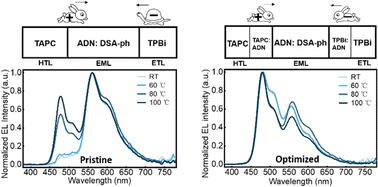Discrimination and control of the exciton-recombination region of thermal-stressed blue organic light-emitting diodes†
Abstract
Organic light-emitting diodes (OLEDs) suffer from carrier imbalance under high temperatures. We improved their thermal stability by using space interlayers adjacent to the charge transport layers. The current efficiency of the optimized OLEDs increased under high temperature, with an increase of over one order of magnitude of the electron mobility.

- This article is part of the themed collection: 2023 PCCP HOT Articles


 Please wait while we load your content...
Please wait while we load your content...